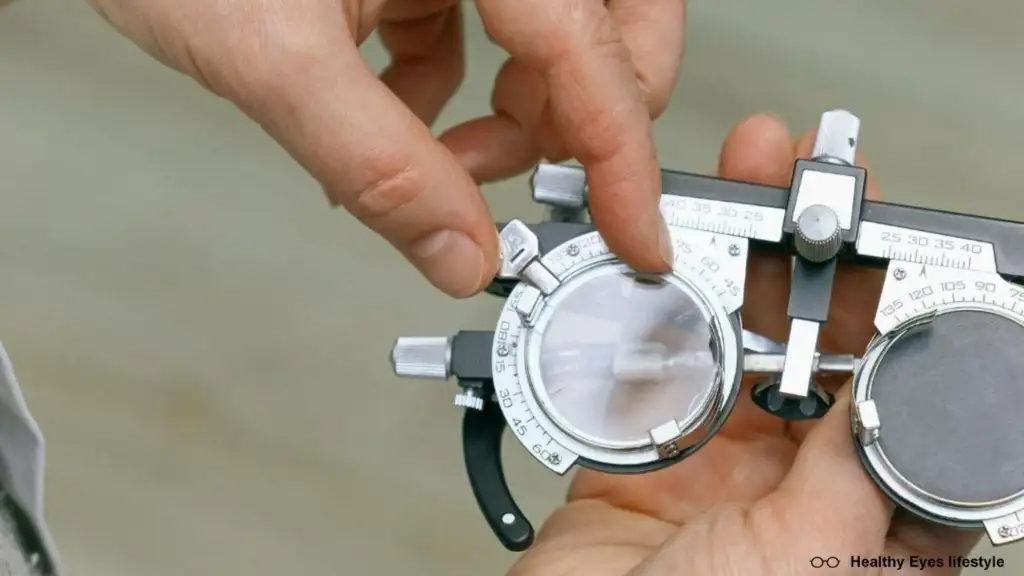Share This Article
Table of Contents
Dizziness is a common complaint that can arise from a wide range of health conditions. While it’s often associated with inner ear problems or blood pressure changes, vision issues can also play a significant role. The connection between your eyes and balance is complex, and problems with your vision can contribute to dizziness, vertigo, and overall disorientation.
This article explores the link between vision problems and dizziness, common symptoms, and how to address these issues for improved balance and overall well-being.

The Vision-Balance Connection: How Vision Affects Your Equilibrium
Your eyes and balance system work together to help you stay oriented in your environment. Vision provides essential information about your surroundings and helps coordinate your body’s movements. Here’s how your vision impacts balance:
- Visual Input and Orientation: The brain uses visual cues to understand spatial positioning. For example, when walking or moving, your eyes provide data about your direction, obstacles, and overall surroundings, helping you maintain stability.
- Coordination with the Vestibular System: The vestibular system (located in the inner ear) is responsible for maintaining balance. It sends signals to the brain about movement and position changes. Your vision works in tandem with this system to help you stay balanced, particularly during rapid movements.
- Proprioception: This is the sense of your body’s position in space. Your vision enhances this sense, allowing you to make adjustments based on what you see.
When any part of this delicate system malfunctions — whether due to vision issues, inner ear problems, or nerve disruptions — it can result in dizziness, vertigo, and balance issues.
Common Vision Problems That Can Cause Dizziness
Several types of vision problems can contribute to dizziness. Identifying and addressing these issues is crucial to restoring balance and preventing symptoms from worsening.
1. Uncorrected Refractive Errors
Refractive errors such as nearsightedness, farsightedness, and astigmatism can cause eyestrain, headaches, and dizziness. These conditions occur when the eye cannot properly focus light on the retina, leading to blurred or distorted vision. If left uncorrected, the brain may struggle to interpret visual information, resulting in dizziness.
| Refractive Error | Description | Symptoms |
| Nearsightedness (Myopia) | Difficulty seeing distant objects clearly | Blurred distant vision, squinting, headaches, dizziness |
| Farsightedness (Hyperopia) | Difficulty seeing close objects clearly | Eye strain, headaches, trouble focusing, dizziness |
| Astigmatism | Irregular shape of the cornea, causing blurry or distorted vision | Blurred or distorted vision at all distances, headaches, and dizziness |
2. Binocular Vision
Binocular Vision Dysfunction occurs when the eyes are misaligned and cannot work together properly. This can cause the brain to receive conflicting signals, leading to visual strain and symptoms such as dizziness, double vision, headaches, and disorientation.
Some common forms of BVD include:
- Convergence Insufficiency: Difficulty focusing on nearby objects due to eye misalignment.
- Vertical Heterophoria: A misalignment in the vertical positioning of the eyes.
3. Vestibulo-Ocular Reflex Dysfunction (VOR)
The Vestibulo-Ocular Reflex (VOR) is a system that stabilizes your vision during head movements by coordinating eye movements with the inner ear. If VOR is impaired, it can lead to dizziness, especially during activities like reading or walking. VOR dysfunction can occur due to eye or inner ear problems.
4. Eye Strain (Asthenopia)
Extended screen time, reading in poor lighting, or straining to see clearly can lead to eye strain, also known as asthenopia. Eye strain often causes headaches, blurred vision, and dizziness. This is particularly common in people who spend long hours working on computers or using digital devices.

How Vision Problems Trigger Dizziness
Vision problems can lead to dizziness in several ways:
- Visual Information Mismatch: When your eyes send conflicting signals to the brain due to misalignment or blurriness, your brain becomes overwhelmed, leading to dizziness.
- Increased Eye Strain: Vision problems cause your eyes to work harder to focus, leading to muscle strain around the eyes. This strain can trigger dizziness, headaches, and fatigue.
- Coordination Breakdown: If your eyes are unable to accurately track movement or focus on objects, it can disrupt coordination with the vestibular system, resulting in balance problems and dizziness.
Symptoms of Vision-Related Dizziness
Vision-related dizziness often comes with additional symptoms that can help identify the underlying cause. Common symptoms include:
- Blurred or Double Vision: Difficulty seeing clearly is a key indicator of vision problems contributing to dizziness.
- Eye Pain or Strain: Constant squinting or focusing can cause discomfort in and around the eyes.
- Headaches: Vision problems often lead to tension headaches or migraines, which can be accompanied by dizziness.
- Difficulty Focusing: Struggling to focus on close or distant objects may indicate a refractive error or other visual issue.
- Nausea: Some people experience nausea or vertigo when visual stimuli and balance cues are mismatched.
Diagnosing Vision-Related Dizziness
If you suspect your dizziness is related to a vision problem, it’s important to see both an eye doctor (optometrist or ophthalmologist) and possibly an ear, nose, and throat (ENT) specialist. Here are some common diagnostic steps:
- Comprehensive Eye Exam: Your eye doctor will perform tests to check your vision, eye alignment, and how well your eyes work together.
- Binocular Vision Assessment: Tests to determine if your eyes are properly aligned and functioning in sync.
- Vestibular Testing: An ENT specialist may perform tests to check for inner ear or vestibular system dysfunction.

Treatment
The treatment for vision-related dizziness depends on the underlying cause. The common treatment options are:
1. Corrective Lenses
Prescription glasses or contact lenses can correct refractive errors such as nearsightedness, farsightedness, or astigmatism. Wearing the correct prescription will help reduce eye strain, improve visual clarity, and alleviate dizziness.
2. Prism Glasses
For individuals with binocular vision dysfunction, prism glasses can be prescribed. These specialized lenses correct eye misalignment by shifting the light entering the eyes, helping the brain process visual information more efficiently.
| Treatment Option | Who It’s For | Expected Outcome |
| Prescription Glasses/Contacts | Individuals with refractive errors such as myopia or hyperopia | Clearer vision, reduced strain, and dizziness relief |
| Prism Glasses | Individuals with binocular vision dysfunction | Corrected eye alignment, improved focus, and reduced dizziness |
| Vision Therapy | Those with issues like convergence insufficiency | Improved eye coordination and balance, reduction in dizziness |
3. Vision Therapy
Vision therapy involves exercises and treatments designed to strengthen the eyes and improve coordination. It’s particularly helpful for binocular vision issues and convergence insufficiency. Over time, vision therapy can help reduce symptoms like dizziness and difficulty focusing.
4. Lifestyle Adjustments
Reducing screen time, taking regular breaks, and ensuring proper lighting can minimize eye strain, reducing the likelihood of dizziness caused by visual fatigue. Additionally, wearing anti-glare or blue light-blocking glasses can help ease eye strain during prolonged screen use.
When to See a Doctor
It’s essential to consult a healthcare professional if you experience persistent dizziness or other symptoms such as blurred vision, double vision, or headaches. Early intervention can prevent symptoms from worsening and help restore balance and comfort.
Conclusion
Vision problems can indeed cause dizziness, but with the right diagnosis and treatment, these symptoms can be effectively managed. Refractive errors, binocular vision dysfunction, and eye strain are all potential culprits behind vision-related dizziness, but treatment options like corrective lenses, prism glasses, and vision therapy can provide relief.
If you’re experiencing dizziness, it’s essential to address any vision issues with a healthcare professional to ensure proper treatment and restore your sense of balance.
FAQS
Can vision problems cause headaches?
Yes, vision problems such as refractive errors (like nearsightedness, farsightedness, or astigmatism) can cause headaches. When your eyes strain to focus on objects due to poor vision, it can lead to tension and discomfort around the eyes and forehead, often resulting in headaches. Correcting these vision issues with glasses or contact lenses can help alleviate the headaches.
What type of headaches are associated with vision problems?
Headaches caused by vision problems are often described as tension headaches or eyestrain headaches. These headaches usually occur around the eyes, forehead, or temples and are more common after activities requiring intense focus, like reading or staring at screens for long periods.



